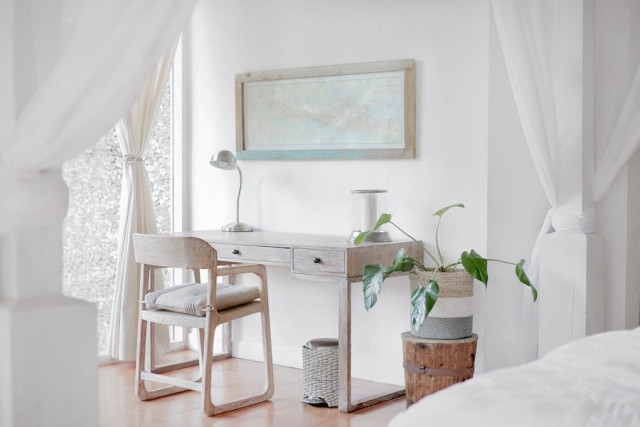Nine small changes that make a happier home
From good smells to simple de-cluttering, here are nine ways you can elevate your space

When your space is piled with clutter or doesn't reflect your personality, it can be hard to feel at home. As compiled from Readers’ Digest, here are some science-backed ways to improve your state of mind by improving the state of your house.
- Keep clutter away

The first step to being truly happy at home is to figure out what to keep and what to let go. “A cluttered room is much more likely to produce and contribute to, a cluttered mind,” says Marie Kondo, author of The Life-Changing Magic of Tidying Up. “I believe that only in an uncluttered room, which enables an uncluttered mind, can you truly focus your attention and your energy on the matters in your life which are preventing you from reaching your truest happiness.”
Less stuff also means fewer things for dust and dirt to accumulate on, and you’ll be more likely to keep it clean because it won’t be so overwhelming. But sometimes, a good cleaning can actually help you feel less stressed and anxious, as a British study found.
- Display meaningful objects
It’s not about the latest home design styles but how an object makes you feel. Still love showing off that soccer trophy from third grade? Keep it! As far as how much to display, balance out the chaos in your life with a visually quieter environment. The amount that feels right may vary from person to person but design psychologist Dr Sally Augustin suggests four or five pictures in a room and a couple of objects on a surface, depending on the size.
- Show your personality
When deciding how a room should look, you might feel taken in by the cool new design trend you saw. But Dr Augustin says making sure your house aligns with your personality is key to feeling happy there. “People who are extroverted get a real charge out of the world around them, so they can enjoy a more sensorially rich environment,” she says. “People who are more introverted have a richer inner world so they should have a more carefully curated space.”
Bolder patterns and colors might stimulate extroverts but overwhelm introverts. A study from Switzerland shows that introverts were more sensitive to visual stimuli than extroverts, so they should have a more relaxing set-up.
- Create a calming space

Finding a “sanctuary” in your home gives your mind a place to go to rest, helping you feel more at peace. A reading nook, a knitting or craft space, or even a “home spa” in your bathroom. Dr Augustin suggests bright but muted colours like sage, soft textures like flannel, warm light, and curved lines in patterns and objects for this space.
- Bring nature inside
Studies have shown nature to be calming so bring in plants or flowers. Interior designer Rebecca West says houseplants have the added benefit of helping to refresh the air in a room, making you healthier. “But if you aren’t blessed with a green thumb, then fresh flowers or even a print of a garden or a wall mural of trees can affect some of that same profound healing.”
- Use light well
Psychologists have long known that light has an effect on emotions. When choosing what kind of light to have in your home, think about what feelings you’re trying to elicit in the space. “Warm light with warm light bulbs is better for when you’re socialising and relaxing, where blue and cooler light is better when you’re trying to do a really analytic task,” Dr Augustin explains.
During the day, open the curtains and let the sun in. “Natural light is great for our mood,” Dr Augustin suggests.
- Choose mood-boosting colours

Your wall can affect your mood so it might be time for a new coat of paint. Colour psychology is an entire field dedicated to understanding the impact shades have on us. “It’s the saturation and brightness levels of hues that determine our emotional response,” Dr Augustin explains.
Energising colours would be make you happier in a place you do work, like a kitchen, laundry, or exercise room, whereas muted colours are better for a relaxing space, like a family room.
- Use the power of scent
Studies have shown smell has psychological effects so use incense sticks, essential oils or candles to evoke good feelings indoors. “Researchers have learned that lavender helps people fall asleep so that can be good for the bedroom, and lemon can be good to smell when you’re trying to do cognitive work like in your home office,” Dr Augustin says.
Be careful not to lay it on too strong — scents will continue to have an effect even after your nose gets used to them. Any smell in too great a concentration is off-putting.
- Fill your home with good memories
Let everything in your house bring up positive remembrances of things and people you love. Each time you look at that picture of you and your friends in Paris, or see the painting you did that turned out better than you ever expected, it helps you keep perspective and connect you with what is good in your life.
On the other hand, purge the things that remind you of negative experiences: A stuffed animal from an ex or a piece of furniture that you inherited but have never really liked.
Have something to add to the story? Share it in the comments below


1601299444-0/FotoJet-(10)1601299444-0-208x130.webp)
1600521049-2/FotoJet-(3)1600521049-2-208x130.webp)















COMMENTS
Comments are moderated and generally will be posted if they are on-topic and not abusive.
For more information, please see our Comments FAQ